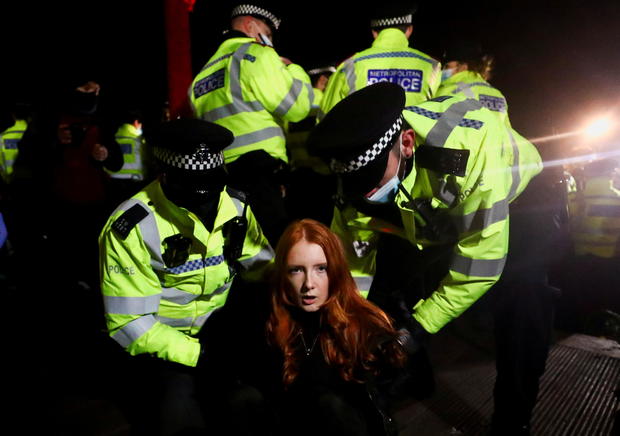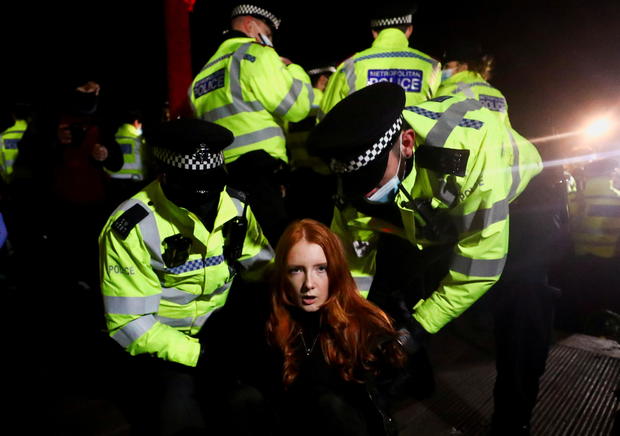London — British lawmakers allowed a controversial new policing bill to proceed on Tuesday evening, legislation critics say would curtail the public’s right to protest. The “Police, Crime, Sentencing and Courts Bill” has become the focal point of demonstrations in London after officers used heavy-handed methods to break up a vigil for Sarah Everard, a 33-year-old woman who was killed last week while walking home at night. The bill will now continue to be debated in Parliament.
The man accused of killing Everard is a serving police officer.
Demonstrators gathered outside the House of Commons as Parliament was debating, chanting “kill the bill.”
“It’s not enough for us to say the police don’t protect us. We must say loud and clear that the police are the causes, not the solution, of the racist and sexist violence experience,” a protest organizer told the crowd gathered in London’s Parliament Square on Tuesday.
“This is for Sarah and for every other woman,” Ngozi Fulani, who runs the London-based domestic violence charity Sistah Space, said. “Sandra Bland, Breonna Taylor, Blessing, whether they’re in America or over here, brutality is brutality.”
“It’s our right. It’s our fundamental right,” said Lena, 22, who joined the Monday evening demonstration in central London. “We are allowed to go out into the street and say to the world: ‘You’re treating us wrong.'”
The policing bill
The “Police, Crime, Sentencing and Courts Bill” would, if passed, give the police additional powers to curtail static protests, including imposing start and finish times as part of any authorization for a demonstration.
“Ever since the first large-scale Extinction Rebellion protest in April last year I have been talking publicly and with the government about the potential for change to powers and to legislation that would enable the police to deal better with protests,” Metropolitan Police Commissioner Cressida Dick said in a statement.
She added that she wanted the new legislation, “specifically to deal with protests where people are not primarily violent or seriously disorderly but, as in this instance, had an avowed intent to bring policing to its knees and the city to a halt.”
The bill would also make it an offense for a protest to block traffic entrances to Parliament, effectively limiting the public’s right to protest outside the seat of the U.K. government.
After the heavy-handed policing of the vigil in honor Sarah Everard on Saturday night — and in light of the fact that the man accused of killing Everard is a police officer — critics have said that, in addition to raising civil liberties concerns, enhancing police powers will do nothing to address the problem of violence against women.
Widespread opposition
More than 150 organizations, including human rights and religious groups and trade unions, sent an open letter on Monday to Britain’s Home Secretary Priti Patel, who oversees law enforcement in the U.K., asking her to reconsider the bill.
They argued that the legislation, which was only published for public scrutiny about a week ago, “is being rushed through parliament during a pandemic and before civil society and the public have been able to fully understand its profound implications.”

“For a country that so often prides itself on civil liberties, this Bill represents an attack on some of the most fundamental rights of citizens, in particular those from marginalised communities, and is being driven through at a time and in a way where those who will be subject to its provisions are least able to respond,” the letter says.
Britain’s opposition Labour Party, which was initially going to abstain on the vote, on Sunday announced that its lawmakers would vote against the bill. Still, the bill was not thrown out entirely, but passed to the next stage of debate, where lawmakers will discuss it in greater detail.
Meanwhile, in response to Everard’s killing, Prime Minister Boris Johnson announced on Monday a plan to tackle violence against women by increasing CCTV coverage and street lighting, and putting more undercover police officers on patrol in bars and clubs when they’re allowed to open again.
But protesters have argued that while CCTV and lighting can be beneficial, especially in light of the Everard case, more police with more powers won’t address the root of the problem.
“We don’t just want over-policing and more police officers who abuse their powers towards women. We want actual action,” said Jennifer, 25, during Monday’s demonstration. “We want money spent on women’s services. We want there to be a cultural change that protects women and fights against misogyny and violence.”
